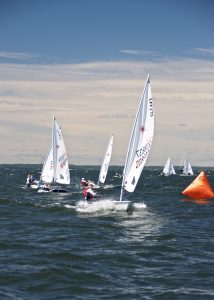
© Rick Bannerot, Ontheflyphoto.net
I was once in a low-slung car in Miami with a client under one of those tall, blue skies. He was telling me about how he got started in the eighties as a dishwasher. We pulled into the pocked parking lot of the eatery where he’d slathered plates in a back sink. We sat looking at the corroded rotary vents and faded lacquer. His colleagues were idling behind us in a Rover. He didn’t say anything, but it was a moment. And then the clutch dropped and we sped off to lunch at a very different eatery where they hustled tables around for him and where he joked in Spanish and talked business in a hushed, baritone English.
Our daughter leaves for college in a few days. I spin the departure as a wee thing analogizing her going off to a business meeting, but we both know different. It, too, is a moment. I only have one child and she’s been away for stretches, from sailing the Atlantic to the frenetic in and out of her attending a nearby boarding school, but this feels different. She’ll do well and the ivy-walled locale is fortunate to have her. It’s just, I will miss her.
She’s a superb sailor, my daughter. Last weekend, I followed in her inflatable as she put a Laser through its gaits. She found decent wind and a nice swell near R2 at the mouth of Narragansett Bay where the Laser would plane off and with me, kidneys rattling, trailing her. I like to think I taught her to sail, but truth is she really learned at the yacht club.
Yacht clubs (a pretentiously awkward term) are the wellspring for many young sailors who go on to compete in serious ways. You don’t often need the provenance of membership to access sailing lessons which is nice and right. And I’m huge champion of learning to sail as a great way for a young child to get traction in life. There’s a wondrous feeling (one I can still conjure) in first having a craft under your control and what sailing brings in the form of responsibility; managing risk and overcoming fear are ingredients important to a successful childhood. Still, for the parent entrusting their child to a venue for sailing lessons, there are some things I’d encourage you to consider in making the selection.
First, sailing lessons should spring from an underlying philosophy of: “First, we have fun.” Sailing is fun. Going fast and winning races will come naturally to those so inclined, but the venue shouldn’t lose prospective sailors by cramming racing into the equation. Teach them the basics on basic boats.
Second, sailing programs should be built on safety as a priority. Like anything, safety is easily spoken, but harder to implement. Look for sailing venues with adequate tender to sailing vessel ratios. That is, for my liking, you need a bunch of tenders each chasing and responsible for a small group of Optis. You need a program where the instructors aren’t sun-addled but attentive and aware of the heavy weight of their primary charge – keeping small sailors safe. Safety from the weather is the traditional mindset, but nowadays I’d argue the focus should start with keeping them safe from other boating traffic.
The recent video stills from Miami apparently showing a barge striking a small sailing dinghy are the sort of nightmare stuff that made this maritime lawyer uneasy during the days of my daughter’s sailing lessons. I’d argue the peril from recreation and commercial traffic is statistically greater than a lightning strike or squall. In my personal opinion, sailing programs should consider taking time to drill their instructors on how to quickly approach and move a sailing dinghy away from the path of an oncoming vessel. I’d venture the primary skillset of a sailing instructor is some degree of sailing skill, and programs should make sure that sailing instructors are also armed with some rapid tactics for moving a dinghy – you don’t always have time for a ‘traditional’ tow. Coming alongside and grabbing a gunnel or powering into (pushing) a dinghy clear should be, I think, regularly and routinely practiced by instructors throughout the season. Setting aside the beards, tattoos and faux machismo of what’s become our policing culture, there’s still something to be said for training as creating a muscle memory that makes smooth those moments of on-the-water stress.
To me, it’s the learning moments in sailing that stick in the gray matter. The first time you feel the boat speed up because of something subtle you did, the surprise of your instinctive move in response to a sudden gust, the coasting run back to the dock after a whippy day on the water, and the thrill of acquiring what arguably is your first “adulting” skill. Those moments build talent, confidence and judgment, but only if they happen in a sailing program that values fun and takes safety seriously. As parents, we can’t control every variable, but we can choose wisely where our young sailors learn.
Indeed, that choice might just be the difference between a fleeting summer pastime and a lifelong connection to the water – the very best moment of all.
Underway and making way. ■
John K. Fulweiler, Esq. is a Proctor-in-Admiralty representing individuals and small businesses in maritime matters including personal injury claims throughout the East and Gulf Coasts and with his office in Newport, Rhode Island. He can be reached at 1-800-383-MAYDAY (6293) or john@saltwaterlaw.com, or visit his website at saltwaterlaw.com.

